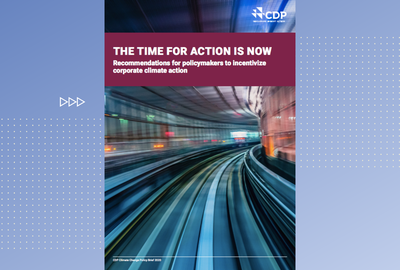
Submitted by nuraltin on November 26, 2020
CDP's new Policy Summary which includes the recommendations for policymakers to incentivize corporate climate action has been released.
We are running short of time: The decisive decade has already begun. The postponement of COP26 to November 2021 is no excuse for inaction – to the contrary – governments must take action as soon as possible. We therefore propose three recommendations for governments to implement to ensure the net-zero transition remains firmly underway. We need governments and non-state actors to go further, faster, together.
Recommendations for policy makers:
1- Strengthen Nationally Determined Contributions (NDCs) and long-term strategies and ensure that they are in line with limiting warming to 1.5°C.
Why are we asking governments to urgently strengthen their climate plans?
2020 is a critical year for increasing climate ambition to limit warming to 1.5°C. The 2019 UNEP Emissions Gap report warns that unless global greenhouse gas emissions decrease by 7.6% every year to 2030, the world will miss the 1.5°C temperature goal of the Paris Agreement. By 2030, emissions must be 55% lower than in 2018 to put the world on the least-cost pathway to limiting global warming to 1.5°C. Urgent government action is crucial to ensure that no more time is lost. The Paris Agreement sets out that Nationally Determined Contributions (NDCs) need to be strengthened every 5 years. With the postponement of COP26 to November 2021, the UNFCCC is now calling on countries to submit NDCs “9-12” months ahead of COP26.
How do Science-Based Targets and netzero 2050 targets fit together?
In contrast to Science-Based Targets, corporate ‘net-zero’ 2050 targets do not currently have a standard definition or commonly agreed requirements, leading to a growing number of high emitting companies stating they will be net-zero in the long term while pursuing a high carbon nearterm business models. Some plans may include growing emissions and relying on future unproven tech solutions and/or large amounts of offsets, using long term promises to avoid the short-term action we need to keep a 1.5°C target within reach. The SBTi which is run by CDP, WRI, WWF and UN Global Compact – along with the We Mean Business Coalition and supporting organizations are now working with companies on science-based net-zero targets, through encouraging companies to sign the Business Ambition for 1.5 pledge. This pledge aims to align as many large businesses as possible with setting a short to medium term, science-based 1.5°C target and being net-zero well before 2050.
2- Ensure that climate risks are transparently managed across the economy, while transitioning to net-zero.
Why mandate disclosure?
The TCFD’s 11 recommended disclosures and underlying principles are a useful, universally and internationally accepted framework to promote greater comparability of disclosures and aid investors in their decision-making and capital allocations. Implementing the TCFD recommendations will deliver the quality of climate-related financial information that investors need for decision-making and the exposure to climate risk can be assessed, reduced and managed by companies.
Which governments are already considering TCFD-aligned disclosure?
In September 2020, New Zealand announced it will become the first country worldwide to implement mandatory TCFD reporting for large banks and insurers – a step that would ensure that around 90% of assets under management in New Zealand fall under TCFD reporting as soon as 2023.
In November 2020, the UK became the first G20 country to set out its intention to mandate TCFD-aligned climate-related disclosures across the economy with most measures in place by 2023 and full coverage by 2025.
Already in May 2020, the Canadian government made TCFD-reporting a requirement for large companies to access COVID-19 emergency loans under its Large Employer Emergency Financing Facility.
In the EU, a range of legislative and non-legislative measures refer to the TCFD recommendations, suggesting that the EU is moving in the direction of mandatory disclosure
3- Capitalize on nature co-benefits and drive action to reduce deforestation through supply chains.
Nature-based Solutions and climate change: what is the link?
The world’s ecosystems, if managed correctly, can provide effective Nature-based Solutions to climate change. NbS is an umbrella term to describe a wide range of ecosystem-based options to mitigate climate change and ensure the sustainability of ecosystems. They can be understood as “actions to protect, sustainably manage and restore natural or modified ecosystems, which address societal challenges (e.g. climate change, food, and water security or natural disasters) effectively and adaptively, while simultaneously providing human well-being and biodiversity benefits.” Conservation, restoration, and the management of ecosystems can play a crucial role in climate change mitigation. Research has shown that Nature-based Solutions can provide over a third of emissions reductions needed by 2030. At the same time, such practices can be important for climate change adaptation, buffering societies from the impacts of climate change and reducing disaster risk. With this dual role, nature can and must play a critical role in climate mitigation and adaptation strategies.
What should policymakers do about it?
Policy makers should mainstream NbS into legislation and regulatory frameworks, improve criteria, metrics, and measurement of NbS and biodiversity. Prevent forests and other high-biodiversity areas from being converted into agricultural land, by requiring due diligence on these issues from companies.
The policy summary can be found here.
Another article released by CDP explains steps for governements to kick-start 2021:
While 2020 – the first year of the ‘decade of climate action’ - was marked with disruptions and delays, most notably the postponement of COP26 to November 2021, important progress was still made – proving that more countries and non-state actors are waking up to the urgency of the climate and ecological crisis. As we enter a new year, we reflect on what the international community has achieved despite the challenges, which areas are still lagging, and focus on what actions are needed to urgently speed up progress.
In December, the five-year anniversary celebration of the Paris Agreement took place in the form of the virtual Climate Ambition Summit co-hosted by the UK, France and the UN, in partnership with Italy and Chile, bringing together leaders from government, business and civil society ready to make ambitious climate commitments.
Overall, the summit heard announcements from 75 leaders, including 45 nationally determined contributions (NDCs) and 24 net-zero emissions plans.
While it was developing countries leading the way, some announcements by major economies stood out, too: The UK’s 68% emissions reduction target by 2030 is the most ambitious pledge yet, while its announcement to end all export finance for fossil fuels was welcomed by environmental campaigners. Other highlights included Denmark’s announcement to end all new oil and gas exploration and production in the North Sea, and Pakistan’s pledge to procure 60% of the country’s energy needs from renewable sources by 2030.
Argentina’s net-zero announcement means that more than half of the G20 countries have now pledged to reach net zero by 2050. However, long-term ambition needs to be backed up by action in the short-term. Yet only around 70 countries – including the EU27 – submitted their plans to reduce emissions by 2030 before the December deadline set by the UNFCCC. Most notably absent were meaningful pledges from big polluters: Australia, Russia, and Mexico all re-submitted existing plans, while Brazil even weakened its already insufficient target. China promised a new NDC at the summit but, so far, remains among the 100+ countries that have not submitted any plans, together with other major economies such as Canada, India, and Indonesia.
As leading businesses and investors show that ambitious climate action is feasible, governments must now step up and put mechanisms in place to mainstream and accelerate action across the economy and unlock further ambition loops – where bold policies and private sector leadership reinforce each other.
As a first step, all countries need to submit updated NDCs as early as possible in 2021, sending strong signals to companies and investors about their countries’ direction of travel, encouraging them to ramp up their climate action. Countries that have submitted NDCs, but failed to significantly increase their ambition, need to urgently re-assess their plans.
Alongside ambitious emissions reductions, countries also need to make sure that Nature-based Solutions are incorporated into NDCs. Mainstreaming nature is not only a cost effective measure to enhance NDC ambition, but also key to protecting biodiversity, improving climate and disaster resilience, and enhancing livelihoods.
Ambitious plans need to be followed by equally ambitious policies to deliver them. Mandating environmental disclosure for companies and financial institutions, in line with the recommendations provided by the Task Force on Climate-related Financial Disclosures (TCFD), needs to be a critical next step for all governments.





